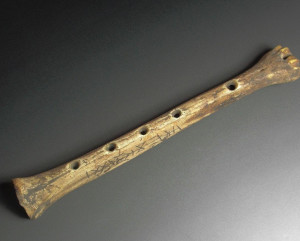Eagle Bone Flute of Prehistoric Bone Flute Culture
481 views · Organized by 茯苓 on 2022-03-01
Bone flute is a kind of flute and the earliest musical instrument. Also known as eagle flute or eagle bone flute, Tibetan, Tajik, Kirgiz edge air-sounding musical instruments, called Dangja in Tibetan. Made of eagle wing bones, it is popular in Tibetan pastoral areas such as Tibet, Qinghai, Yunnan, Sichuan and Gansu. Often used for solo. It is a self-entertainment wind instrument favored by Tibetan youths. It is mostly played for self-entertainment during grazing or field work in summer.

A bone flute (remnant) from the Northern Dynasty (4th to 5th century AD) was unearthed at the Tuokuzsalai site in Bachu County, Xinjiang. The Tajik people call it Nayi, and the Kirgiz people call it Choaor. It is made from the wing bone of a big eagle, about 25 cm long and 1.5 cm in diameter. The inside of the tube is hollow, both ends are connected, and three holes are opened at the lower end of the tube. When making, first clean the flesh and bones, saw off the joints at both ends, smooth the upper and lower nozzles, and remove the marrow. The nozzles at both ends are oval, the upper port is larger, and the lower port is smaller. From the lower port upward, drill a sound hole with a diameter of 0.7 cm (slightly elliptical) every 2.2 cm or so, with a total of three holes. The flute body is decorated with carved patterns or inscriptions. It is mostly used in grand festivals and wedding occasions, and is also used as an accompaniment for singing and dancing, sheep holding, and horse racing. The music includes "The Tower Wants Myself" and so on.
Involving musical instruments
Bone flute (pinyin: gǔ dí), is a kind of flute, also known as eagle flute, eagle bone flute, jay, first discovered 8,000 years ago, Tibetan, Tajik, Kirgiz edge-edge air-sounding musical instruments, often used for solo.
Guess you like
Organized by 苏肆 on 2022-10-18
This musical instrument is only about the length of chopsticks. It is made of the big eagle's ulna. It is warm and light yellow. He called it "bone Yue" (the same sound as "Yue"), and more people called it "bone flute", which originated from Jiahu, Wuyang, Henan. Eight or nine thousand years ago, Jiahu ancestors invented this musical instrument.
read >>
Organized by 小饼干 on 2022-03-11
There was a businessman in Tai'an named Li Ma. He once went to Wumeng House to do jade raw material business. Sometimes, in order to wait for good raw materials, he often lived for three or five months, and he usually borrowed from a local farmer. Once, he passed by a house unintentionally and heard someone playing a flute inside.
read >>
Organized by 钟离 on 2022-03-11
It is said that "one piece of Henan history, half of China's history", at the end of 2021, Kevin visited the Henan Museum, and the breath of history that came to him made Kevin feel the rich heritage, culture, art and historical heritage of Henan culture.
read >>
Organized by 爱在西元 on 2022-03-01
In the spring of 1994, farmers in Sanzuodian Village, Chutoulang Township, Songshan District, Chifeng City, Inner Mongolia found a bone flute while planting trees.
read >>
Organized by 尘夕 on 2022-03-01
Jiahu Bone Flute, as the earliest playable musical instrument discovered in the world, is the first of the "Nine Treasures of the Town Courtyard" in Henan Museum, and it still exudes a charming brilliance.
read >>

 渝公网安备 50010702504639号
渝公网安备 50010702504639号